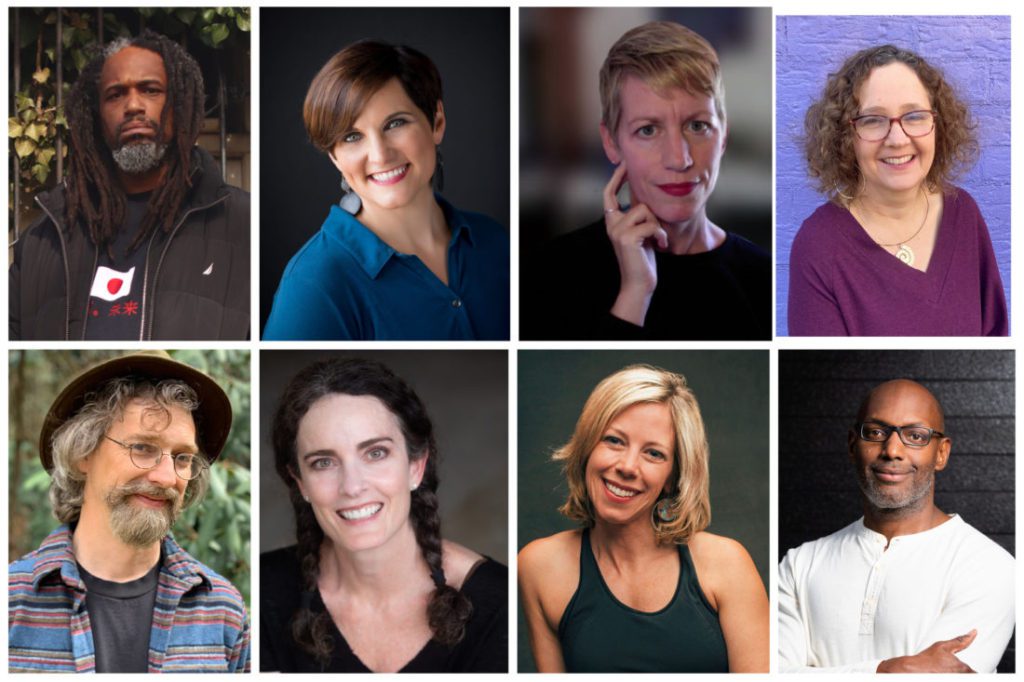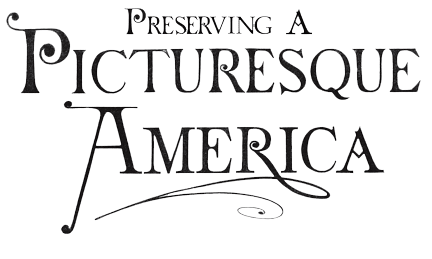
2021 in review: Arts leaders reflect on a tumultuous year
Posted on December 26, 2021 by Edwin Arnaudin

MOVERS, SHAKERS: Clockwise from top left, Davaion “Spaceman Jones” Bristol, Annette Saunooke Clapsaddle, Alli Marshall, Tamara Sparacino, Reggie Tidwell, Jessica Tomasin, Jennifer Trudrung and Scott “Doc” Varn look back on the year that was. Photos courtesy of the artists
Xpress asked eight local members of the arts community to discuss the highs and lows of an unpredictable year. Featured below are reflections from Davaion “Spaceman Jones” Bristol, hip-hop artist and Urban Combat Wrestling founder; Annette Saunooke Clapsaddle, author of Even As We Breathe; Alli Marshall, creator of Asheville Music History Walking Tour; Tamara Sparacino, Asheville Community Theatre interim executive director; Reggie Tidwell, photographer and graphic designer; Jessica Tomasin, Echo Mountain Recording studio manager and Asheville Music Professionals co-founder; Jennifer Trudrung, actor, screenwriter and director; and Scott “Doc” Varn, Preserving a Picturesque America founder.
What person or local business within your industry made a significant difference in 2021 and why?
Saunooke Clapsaddle: I have been most excited to see the work of three Eastern Band Cherokee women — Maggie Jackson, Sheyahshe Littledave and Ahli-sha Stephens — who created and launched the We Are Resilient: A MMIW True Crime Podcast. This podcast shines a critical spotlight on the plight of missing and murdered Indigenous women in the U.S., as well as brings a Native American cultural lens to the conversation, thus creating awareness and building a more nuanced approach to addressing this national crisis.
Marshall: The Sly Grog Lounge does so much to offer performance space to fringe and experimental acts in Asheville’s arts scene. The staff and owners are wonderful supporters of local art and music, and their outdoor patio made it possible for live music to return to the venue even during the pandemic. I encourage everyone to help Sly Grog recover from the fire it recently suffered — a number of benefits have been organized.
Tomasin: Many artists turned to livestreaming during the pandemic, and one person who really stepped up to the plate in our music community is Josh Blake. He founded and runs IamAVL (Independent Arts and Music Asheville), which has been behind livestreams in our community for years, including “Echo Sessions,” streamed live from Echo Mountain and then broadcast at a later date on PBS. When the pandemic hit, Blake was primed and ready to elevate the quality of the numerous livestreams that came out of our music community. He and his team were pivotal in facilitating a way for many artists to access high-quality streaming services while also raising roughly $45,000 for artists.
Sparacino: ACT has been working with Alexandria Ravenel and David Greenson from Collaborative Organizing in 2021. They are leading us in meaningful and hard conversations around racism. I find both of these people deeply inspiring because they are listeners as well as truth-tellers, and are creating space and accountability for facing the difficult work ahead of us. The difference that this will make is yet to be fully realized, but it’s an opportunity to grapple with our shadow side, both individually and organizationally. If we can do it honestly and with care, we can significantly change how we impact our world.
Bristol: For me, it’s not just one person. It’s the people who choose to buy the tickets and the merchandise — the ones who come to events. They are the folks who made the most difference. Paying attention to what they want and delivering it is very important.
What was the greatest threat to your industry or arts community this year?
Trudrung: I was incredibly excited to return to movie theaters this year — partly because I know how much the independent cinemas in town struggled during the pandemic. I also know the lack of a live audience was incredibly hard for the live theater community. The financial strain of not having regular shows had a huge impact on the industry. Also, many actors and crew members struggled financially because TV and film production was still limited this past year.
Tidwell: The greatest threat to the graphic design industry in 2021, as I see it, was burnout. I talked to many people that feared they were close to burnout because they were working more and vacationing less. I think so many people still aren’t comfortable traveling, and it has taken its toll. In the photography industry, the lack of travel hasn’t necessarily led to potential burnout, but it has lessened the size of our playground, so to speak.
Varn: It has been a challenging year for everyone navigating the ever-changing data stream and subsequent emotions. In some ways, that has been a new target of inspiration for creatives. Having subject matter that literally everyone can relate to affects the creative process tremendously. But for those not in the creative field taking advantage of that outlet, it’s simply confusing and frustrating. So, I don’t necessarily blame the community for their lack of financial support to the artists. I don’t believe that most realized that purchasing art in these challenging times is still important.
Bristol: The greatest threat is still COVID. We have a ton of light at the end of that particular tunnel with vaccinations, which will do more to help us out of this fear that’s kept us in for so long. More folks will be out and about and looking for things to do — and that’s good for all of us.
Saunooke Clapsaddle: Indie publishers and bookstores are poised to best put authentic narratives in the hands of readers. So, the greatest threat to authors this year is a continued consolidation of major publishing houses and a reliance on big business book sales. When this occurs, fewer diverse voices are made accessible to readers, and community literacy suffers as online retailers push out independent presses and bookstores. This trend threatens not only the arts and artists, but also small-town economies. As publishing and sales become more corporate, it is increasingly difficult for independents to financially survive. If they don’t survive, writers don’t survive.
Tomasin: COVID has continued to shake the entire music industry. We certainly did not go “back to normal.” Tours and festivals constantly had to grapple with difficult decisions in order to prioritize safety, often at a significant financial cost. Even livestreams and recording sessions required vigilance to keep from spreading the virus. Although some concerts and tours did occur over 2021, many were rescheduled or canceled, and there are a large number of professionals in our music community who continue to be financially devastated by the pandemic.
What inspired you this year and how did you use this inspiration within your work?
Trudrung: This past year I have struggled with watching my father disappear with dementia. What has kept me afloat is my family, friends and the horror genre. This may be a strange combination, but for me, horror is all about confronting your fears but in a safe place. My anger, grief and fear have become my creative catalyst. And this past year has been all about writing horror/comedies because I’ve learned laughter within grief is the best therapy.
Marshall: Watching my fellow artists (and arts-related businesses) pivot, adapt and move forward has been exciting. Based on that idea, I’ve been creating a spoken-word production for the stage called The Top-Ten Superpowers of All Time. It’s about how success is less about winning and more about showing up with whatever talents and tools we have on hand. I’ll be performing the piece at the 2022 Asheville Fringe Arts Festival in late January.
Tidwell: My biggest inspiration of the year has been family. Not just biological family but also close friends who are much like family to me. That kind of connection gives me the motivation to thrive and inspire others.
Sparacino: I recently took my 11-year-old daughter to Asheville Community Theatre’s youth performance of Clue, and her delight at the antics of the characters, played hilariously by high school youths, was a high point for me. As I watched those kids onstage masterfully playing comedic moments — after everything kids have been through these past two years — hearing my daughter laugh in the seat beside me gave me hope. Theater has that power to put us all in a room together to laugh. I don’t think there’s anything more important, right now, than that.
Varn: The early adventure artists that helped create a conservation movement have always been inspiring to me. But the kindness and generosity of the current artists has been deeply moving. These are some of the people with the biggest hearts and greatest character that I’ve ever met. They understand their duty to protect the landscape that inspires their art and have stepped up with their love of this community and the natural world. Hearing their voices as unique, yet unified under one mission, has lifted me up and strengthens me to keep moving forward.
Saunooke Clapsaddle: My students are nothing short of inspiring. Their energy in the face of an uncertain world is heartening. They bring hope and kindness into my classroom every day and teach me more than I can ever teach them. Additionally, had it not been for beautiful trail systems like Fire Mountain and Tsali, I quite possibly could not have continued to write. They provide an escape from daily pressures and an opportunity to deeply engage with our environment without having to travel far from home. I crave this balance as I create. I craved it more as the pandemic unfolded.
